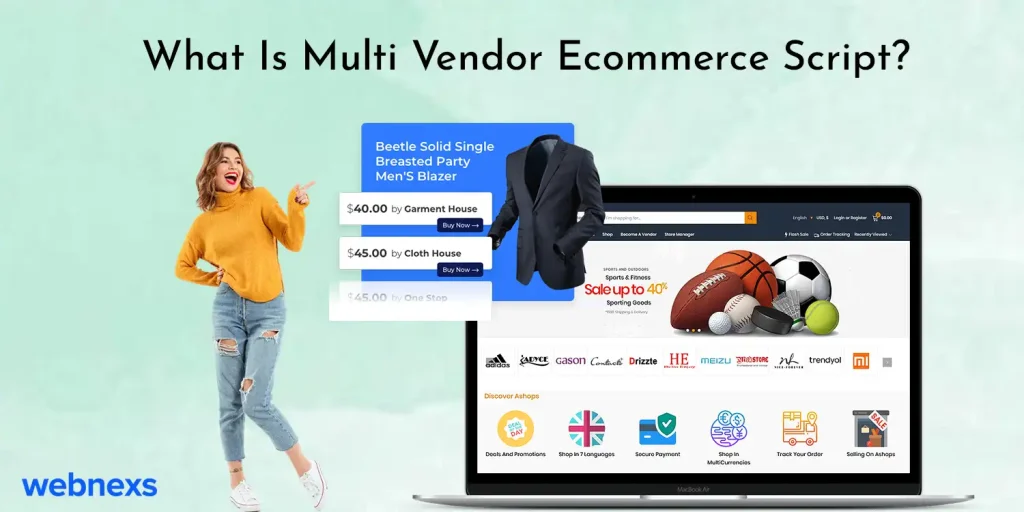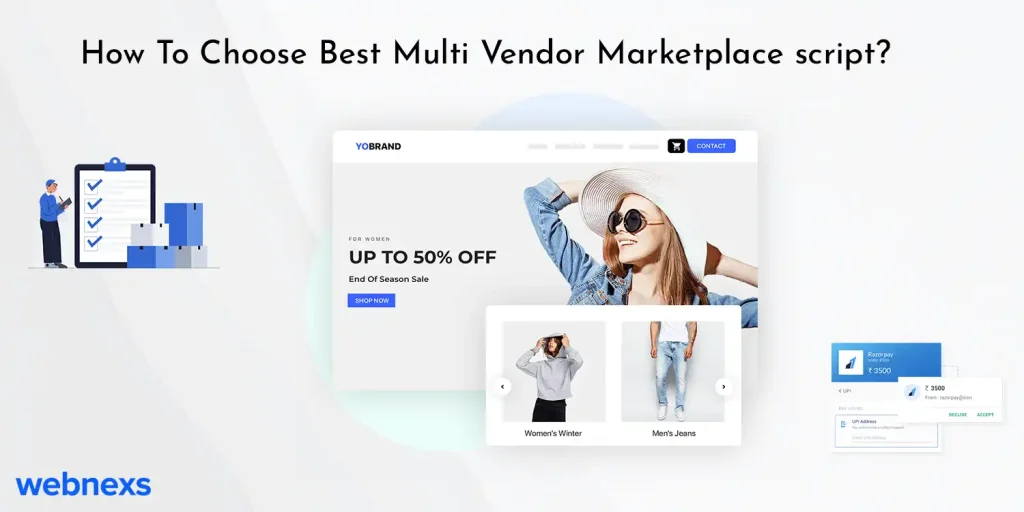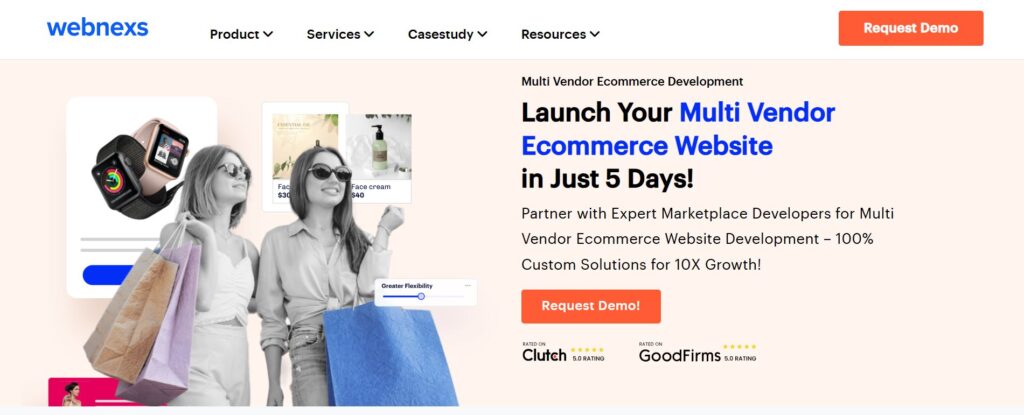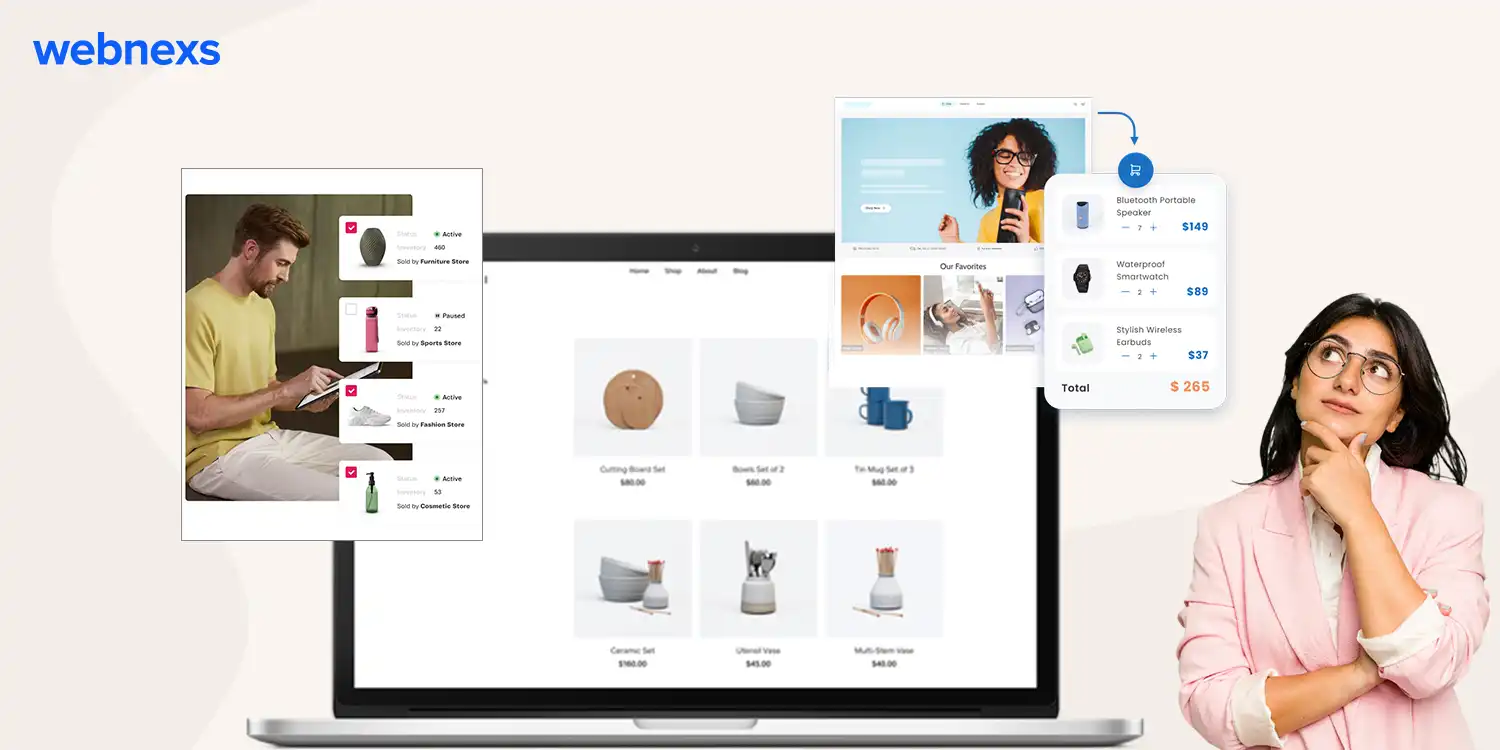Hey readers!
Let’s begin by breaking down the term “Marketplace Script”.
It’s like the engine behind platforms such as Amazon, or eBay, where many vendors can operate mini-stores under one main website.
In technical terms, it is a pre-built software solution for building an online store.
The guide to selecting the best ecommerce script begins with the need to achieve the short-term and long-term business goals. Since it is the platform upon which revenue is generated, thorough research is required.
Wrong choices have led online marketplaces to their doomsday. It’s about gaining traction by replacing the script after the loss, but also the loss of reputation and a customer base who would never consider repeating their purchases.
In this blog, we will explore the factors to consider before choosing the best ecommerce script. The most viable scripts are the ones that are chosen to align with the goals.
Build Your Multi Vendor Marketplace Website Today!
Key Takeaways On Best Multi Vendor Marketplace Script
- A script is a pre-built software solution that can be used to build an online store. It is an efficient way of developing an ecommerce platform, in terms of time and effort.
- Marketplace types include single and multi vendor, where the difference lies in the number of vendors onboarded, with multi vendor having many and single vendor having only one.
- There are various types of scripts for the marketplace, including open-source, SaaS, custom, and headless, with each having its own unique advantages.
- A feature-rich multi vendor marketplace script creates a win-win-win scenario for marketplace owners, vendors, and buyers.
- When choosing ecommerce scripts, business model fit, scalability, performance, and customizability are the key aspects to consider.
What Is Multi Vendor Ecommerce script?

Why is it called a script?
In software terms, multi vendor ecommerce script is a set of code written to instruct the server to perform tasks as requested.
Multi-vendor script performs the tasks needed to process everything from listing products to processing transactions. This pre-built set of codes removes the need to develop separate logic and makes the process efficient in terms of time and effort.
Deploying the script:
- Install the script on the web hosting/server.
- Customize the display.
- Sign up.
- Start product listing.
- Customers process transactions.
- Revenue is earned.
Multi Vendor Marketplace Script vs. Regular Ecommerce Platforms
| Basis | Multi-Vendor Marketplace | Regular E-commerce Platform |
| Sellers | Multiple independent vendors sell through one platform | Only one seller (usually the platform owner) |
| Vendor Access | Vendors have their accounts and dashboards | Only the admin manages the platform |
| Product Management | Vendors upload and manage their products | Admin handles all product listings |
| Order Handling | Orders are split and sent to respective vendors | All orders are processed by the single store owner |
| Revenue Model | Platform earns via commissions from vendor sales | Profit comes from direct product sales |
| Scalability | Highly scalable as more vendors join | Limited to business capacity of one seller |
| Maintenance | More complex due to vendor coordination | Easier to manage and maintain |
| Examples | Amazon, Etsy, Flipkart | Brand-owned stores like Nike or Apple |
Build Your Multi Vendor Marketplace Website Today!
Types of Multi Vendor Marketplace Scripts
1. Open Source Scripts
Open-source scripts are self-hosted and provide full access to the source code, giving you complete control over customization.
Examples: Webnexs, WooCommerce + Dokan, OpenCart, Bagisto.
Features
- Full customization options
- Free to use
- Large community support and plugins are available
- Requires technical expertise to set up and maintain
2. SaaS-Based Scripts
They are ready-made solutions with subscription-based pricing hosted by SaaS platforms by the providers. They require less technical knowledge, which makes it easy to set up and manage.
Examples: Wcart, Sharetribe, CS-Cart Multi-Vendor, Shopify
Features
- Cloud-hosted, meaning no need for internal hosting or server management
- Subscription-based, with all features and support included in the plan
- Automatic software updates and ongoing maintenance
- User-friendly setup with a drag-and-drop interface
3. Custom-Built Scripts
Fully tailored to specific requirements, which are created using modern web development frameworks like Node.js, Django, or Laravel. They provide maximum flexibility but require development from scratch.
Examples: Custom-built using Webnexs Ecommerce, Laravel, Django, Ruby on Rails, Node.js.
Features
- Completely tailored to your business needs
- Full control over every aspect of the platform
- Can integrate complex workflows or unique features
- Requires a skilled development team and longer development cycles
4. Headless Marketplace Scripts
Headless scripts use a decoupled architecture, where the backend is separate from the frontend. This allows you to design custom front ends and deliver content across multiple platforms using APIs.
Examples: Webnexs, Strapi + React, Commercetools, Vue Storefront + Magento
Features
- Provides flexibility to build custom, dynamic front ends while using a powerful backend.
- Can deliver content to any device using APIs.
- Faster load times, high performance, and scalability.
- Requires expertise in both frontend and backend.
Build Your Website With Headless Ecommerce Platform Today!
Benefits Of Multi Vendor Ecommerce Script
1. Quick Time-to-Market
- Launch the marketplace faster with pre-built modules for products, vendors, payments, and more.
- No need to build from scratch and save months in development time.
2. Cost-Effective
- One-time license or subscription-based model, which is much cheaper than custom development.
- Reduces the need for a large in-house tech team.
3. Scalable Architecture
- Most scripts are built with scalability in mind to handle growing vendors, traffic, and transactions.
- Add new features/modules as the business grows.
4. Multi-Vendor Management
- Easily manage payouts, vendors, and commissions.
- Sellers should be allowed to manage their inventory, products, and orders through vendor dashboards.
5. Built-in Revenue Models
- Supports commission-based earnings, subscription fees, and featured listings.
- Helps monetize the marketplace in multiple ways.
Top Features of a Good Multi Vendor Marketplace Script
1. Vendor Management System
A strong vendor management system allows multiple sellers to join and operate their stores within the platform. Each vendor should get a dedicated dashboard to manage:
- Product listings
- Orders and returns
- Earnings and payouts
- Store profile and branding
2. Commission & Payment Handling
To make revenue, the marketplace needs a flexible commission model. A good script will enable:
- Setting fixed or percentage-based commissions
- Applying commissions globally or per vendor/category
- Automating vendor payouts via wallets or payment gateways
3. Product & Inventory Management
Vendors should have full control over their products. A solid system will allow:
- Adding or updating products quickly with images, pricing, and stock
- Managing product variations
- Tracking stock levels and getting alerts when inventory is low
- Uploading products in bulk via CSV or Excel
4. Order & Shipping Management
Orders can involve multiple vendors, so the system must:
- Split orders by vendor automatically
- Assign delivery responsibilities per seller
- Show order status updates
- Integrate with major shipping providers for tracking
5. Admin Control Panel
The admin dashboard gives the marketplace owner full oversight. It should allow:
- Managing vendors, customers, and orders
- Moderating product listings and reviews
- Setting commissions, taxes, and shipping rules
- Viewing reports and analytics
- Handling customer support tickets
Build Your Multi Vendor Marketplace Website Today!
How To Choose Best Multi Vendor Marketplace Script?

Random script selection will not work as compatibility issues will lead to underperformance of the ecommerce platform. Informed decision-making based on factors and real-time examples will create awareness of barriers faced when the site is live in the browser. This will ensure that the ecommerce platform is optimized for maximum efficiency.
1. Scalability & Performance
As the marketplace grows, an increasing number of vendors, products, and customers must be catered to in order to accommodate their needs. A lightweight, modular, and scalable online marketplace script can handle heavy traffic without crashing or slowing down.
Example
Etsy, an American ecommerce company, served the niche market of handmade items and later scaled up to support millions of sellers worldwide. Without compromising on platform performance, their tech stack and choice of a reliable multi vendor script were designed to handle heavy traffic even during peak times.
Consider:
- Load balancing support
- CDN (Content Delivery Network) compatibility
- Caching mechanisms
- Optimized database architecture
2. Vendor Management Features
A user-friendly platform must be provided for vendors, a multi vendor marketplace script that gives control over their processes and one that simplifies workflow is required.
Example
Amazon, again an American ecommerce giant, with its Seller Central provides the sellers with necessary tools to manage their order and view analytics. This vendor-friendly approach helped them gain millions of sellers.
Consider:
- Easy vendor onboarding
- Separate vendor dashboards
- Earnings and analytics reports
- Product and order management tools
- Custom storefronts for vendors
3. Customizability & Extensibility
Market demands are fluctuating, and to keep up, a platform must allow customizability as and when required. With a customizable multi vendor ecommerce script, designs can be tweaked, and features can be added or removed to resonate with the target audience.
Example
StockX, an American Unicorn Startup, customized its platform to operate like a stock market for sneakers. The back end was customized to handle bidding, dynamic pricing, and authentication processes, which are typically not supported by generic platforms.
Consider:
- Access to source code or APIs
- Modular architecture
- Support for plugin/add-on systems
- Developer-friendly documentation
4. Payment & Commission Flexibility
Multiple revenue streams must be provided with a way to split payments between vendors and the admin automatically. This is a core part of monetizing your marketplace. A good multi vendor script ensures features work smoothly for uninterrupted transaction processing.
Example
Upwork, an American freelancing platform, has automated payments with milestone systems and tiered commissions (20% to 5%) based on billing volume with a client. This dynamic model keeps the ecosystem profitable.
Consider:
- Multiple payment gateways
- Wallet systems or escrow handling
- Vendor-specific or category-based commissions
- Auto-payout scheduling
5. SEO, Marketing & User Acquisition Tools
A great platform is useless without traffic. The multi vendor ecommerce script must support SEO features, promotions, and integration with third-party tools to attract and retain users.
Example
Not On The High Street, a UK-based online marketplace, focuses heavily on SEO and social media ads. Their marketplace script includes tools for vendors to add meta tags, run discounts, and participate in platform-wide campaigns.
Consider:
- SEO-friendly URLs, tags, sitemaps
- Email marketing integration
- Push notifications
- Coupon, referral & affiliate programs
6. Mobile Responsiveness & App Availability
Over 70% of ecommerce traffic comes from mobile devices. The multi vendor script must be of a good choice to enable the platform to perform well across smartphones and tablets, otherwise, churn rates would increase.
Example
Poshmark, a U.S.-based fashion resale marketplace, built its business model around a mobile-first experience. It attracted millions of users, driving high engagement and repeat purchases.
Consider:
- Responsive front-end design
- Progressive Web App (PWA) support
- Availability of native mobile apps (Android/iOS)
- Seamless mobile checkout process
7. Security & Compliance
Security breaches in a multi vendor marketplace script ruin reputation. Also, laws like GDPR, PCI-DSS, and CCPA require that the marketplace protect user data and payment information.
Example
Farfetch, a British luxury online store, invested heavily in GDPR compliance and secure payment systems to win over European customers. This trust allowed them to expand globally.
Consider:
- SSL encryption
- GDPR-ready user data policies
- PCI-compliant payment integrations
- Role-based admin access
- Two-factor authentication (2FA)
8. Technical Support & Community
No marketplace script can be perfect. When bugs or upgrades are needed, having a responsive support team or active community can save time and money.
Example
Some platforms have a massive community and plugin ecosystem. Many businesses choose it because they know help is always available.
Consider:
- 24/7 technical support
- Documentation and tutorials
- Active forums or developer community
- Regular updates and bug fixes
Build Your Multi Vendor Ecommerce Marketplace Today!
Build a Profitable Online Store with a Powerful Multi Vendor Marketplace Script from Webnexs

Our tech stack is carefully selected to be a solid choice for building an ecommerce store. We focus on building a store using a multi vendor script that can deliver high performance, scalability, and flexibility. Users can enjoy fast, smooth shopping across all devices and secure transactions that are devoid of sudden crashes.
Explore all the advantages that will give the platform an edge over other players. A platform that can consistently deliver an uninterrupted shopping experience will sell in the market. Connect with Webnexs and discover how we make this a reality for your ecommerce business!
Wrapping up
The significance of choosing the right multi vendor ecommerce script lies in striking a match between the platform’s capabilities and the user’s accessibility. A range of arising issues will affect the platform and, eventually, the website traffic; severe loss can be incurred as a result.
Consideration of various aspects is important before choosing the right ecommerce platform. This indicates that the quality of your online store begins with choosing the right tech that will build your platform. A quality experience guarantees word-of-mouth or repeat purchases that increase the customer base over time.
Have a look at our multi vendor ecommerce marketplace script today and contact us to look at our demo!





